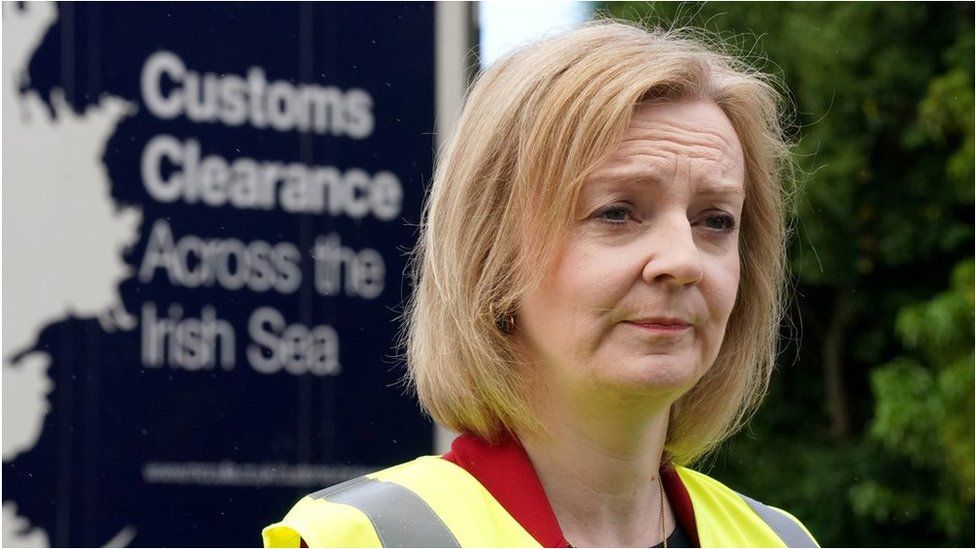Northern Ireland Protocol: Is Truss right about public opinion?
- Published

The government has been defending its plans to scrap parts of the Brexit deal for Northern Ireland - known as the protocol - which it negotiated with the European Union.
Foreign Secretary Liz Truss told BBC Radio 4's Today programme: "The majority of people in Northern Ireland believe that the protocol needs to change."
The government has published a Protocol Bill with plans to get rid of post-Brexit checks on goods from Great Britain destined for Northern Ireland and reduce the role of the European Court of Justice.
The EU, which published a plan to reduce checks in October 2021, has launched infringement proceedings against the UK for not complying with the protocol.
In May's elections, the majority of voters in Northern Ireland voted for parties that support the protocol, and the majority of assembly members now support it. However, no unionist members support it.
So what evidence is there for Ms Truss's claim?
We asked the Foreign Office. It pointed us towards an online poll of more than 3,000 people by Lord Ashcroft Polls (run by the former Conservative Party treasurer who supported Brexit). It was conducted in November 2021 and published the following month.
- 33% thought the protocol should be scrapped
- 9% thought it needed serious reform
- 36% thought it would be acceptable with some adjustments
- 21% thought there were no problems with the protocol
- 1% had no opinion
The pollsters did not define what "serious reform" or "some adjustments" amounted to.
Of course, saying that "some adjustments" would make the protocol acceptable does not mean those people would necessarily support the scale of changes the UK government is proposing.
The Alliance Party, for example, which is the third biggest party in the assembly, said in its 2022 manifesto that it was in favour of negotiated EU-UK changes to the protocol. So it is certainly in favour of change, but could not be described as being in favour of the UK government's current position.
Indeed, its assembly members were among those who signed a letter to the prime minister rejecting the government's new Protocol Bill.
Another way of reading the poll would be that 42% of people thought the protocol should be scrapped or needed serious reform while 57% thought it was fine as it was or needed some adjustments to be acceptable - a majority.
Liz Truss has referred to this polling before in Parliament, telling MPs on 22 May: "An overwhelming proportion of people in Northern Ireland - 78% - agreed that the protocol needed to change in polling conducted in December 2021."
"It is simply not true to say that a majority of people in Northern Ireland support the protocol."
You get to 78% if you add up the people who thought it should be scrapped, those who thought it needed serious reform and those who thought it would be acceptable with some adjustments.
But that figure encompasses a very wide range of opinions on the protocol.
And there is considerable doubt about the foreign secretary's claim that a majority of people in Northern Ireland do not support the protocol.
Queens University Belfast and UK in a Changing Europe have been carrying out regular polling of people's opinions of the protocol - since it came into force on 1 January 2020.
In February 2022, they found that 50% of people saw the protocol as the appropriate means for managing the impact of Brexit on Northern Ireland and as overall "a good thing for Northern Ireland" - 40% of respondents held the opposite view.
That was quite a change from its polling in March 2021, when 43% of people thought it was a good thing and 44% disagreed.
The authors of the research found that a big factor in people's views was how they felt about Brexit. People who opposed Brexit were more likely to support the protocol and vice versa.
In the 2016 referendum, 56% of voters in Northern Ireland were in favour of remaining in the EU.